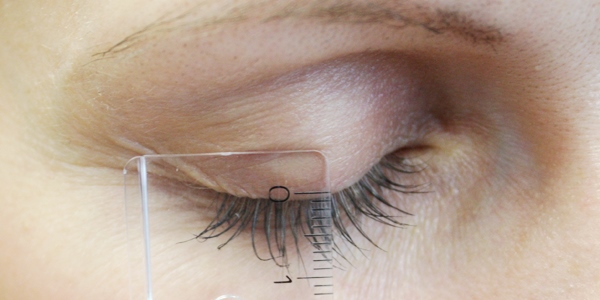

The plant-based substance allows lashes to grow visibly stronger – without any identifiable side effects.
Fraunhofer IAP
Longer and thicker lashes – these are the side effects of eyedrops used to treat glaucoma in ophthalmology. Hair growth is triggered by prostaglandin, a tissue hormone that lowers internal eye pressure. The side effects have received a lot of attention in the cosmetic industry and eyelash products containing a modified form of prostaglandin have been available ever since.
They promise lashes will be around 80 percent longer and thicker within 30 days. Critics advise using caution when handling the cosmetics as internal eye pressure can decrease if the product gets into the eye. In addition, a reddening and burning sensation can occur in the eye, and eyelashes and eyelids can become discolored.
Dr. Joachim Storsberg and his team at the Fraunhofer IAP have therefore developed a formulation that can be specifically used in cosmetics and whose active ingredient is purely plant based. “Our work has shown that this new formulation has delivered good results that are comparable with those of prostaglandin products. Eyelash growth is slower, however there has been no evidence of any side effects”, says Storsberg who heads the department »Biomaterials and Healthcare« at the IAP.
The natural substance will remain a secret for now. “We are currently working on optimizing our process to achieve optimal application. We are also developing other nature-based alternatives to prostaglandin preparations. We welcome project partners since we also take on contract development”, explains Storsberg.
Mine Kaya is studying chemistry and pharmaceutical technology at Beuth University of Applied Sciences in Berlin. As part of her bachelor’s thesis she worked in Storsberg’s department to develop and investigate potential application systems for eyelash sera and anti-aging applications for the area around the eye. She received a SEPAWA award from the association of soap, perfume, cosmetics and detergent specialists SEPAWA. She got third place in the category “Outstanding Graduates with Bachelor’s Degrees”. The SEPAWA program fosters junior scientists.
Fraunhofer Institute for Applied Polymer Research IAP
The Fraunhofer IAP in Potsdam-Golm, Germany, specializes in research and development of polymer applications. It supports companies and partners in custom development and optimization of innovative and sustainable materials, processing aids and processes. In addition to the environmentally friendly, economical production, functionalization and processing of polymers in the laboratory and pilot plant scale, the institute also offers the characterization of polymers.
Synthetic petroleum-based polymers as well as biopolymers, polymers from renewable raw materials and chemically, physically or biologically functionalized polymers are in the focus of the institute’s work. The applications are diverse, ranging from biotechnology, medicine, pharmacy and cosmetics to electronics and optics as well as applications in the packaging, environmental and wastewater engineering or the aerospace, automotive, paper, construction and coatings industries. | Director: Prof. Dr. Alexander Böker












